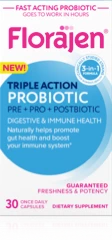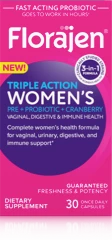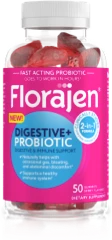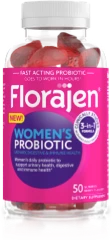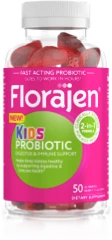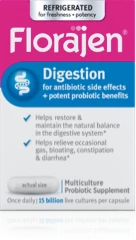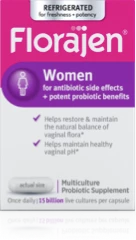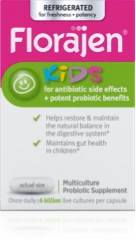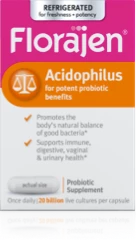Probiotics: Your secret weapon for cold and flu season
For us, alerting our patients to new ways to boost immunity or rebound from illness quickly is one of the best parts of the job. Given last year’s notoriously bad flu season, now is the perfect time for doctors and pharmacists to give advice to patients who should be more receptive to our advice than ever.
Over the coming months, we’ll all be repeating the classic methods of avoiding cold and flu on a constant loop: wash your hands, get the flu shot, cough or sneeze into your elbow, repeat. But in addition to the classics, all of us as health care professionals have an opportunity to expand the conversation with customers and patients to include probiotics, which can help the body’s immune system protect itself from germs.
A huge amount of the immune system is in the GI tract. As such, setting the gut up for optimal health is of utmost importance when it comes to increasing immunity. Probiotics go a long way in helping maintain a balanced community of microorganisms in our systems and stabilizing our digestive and vaginal tracts’ barriers against “bad” bacteria. In addition to taking a probiotic, eating nutritious food and only taking antibiotics when truly necessary are other ways to ensure strong gut health.
And for those unlucky 5% to 20% among us who will come down with the flu, according to the Centers for Disease Control and Prevention (CDC), we also have a chance to educate them about how probiotics can help them achieve a quicker and smoother recovery. Many don’t realize that the antibiotic kills both good and bad bacteria, thereby disrupting the natural microbial balance that our bodies need to stay healthy.
Concurrently taking a probiotic helps to counterbalance the unpleasant side effects caused by antibiotics that are mistakenly attributed to an extra wicked cold or flu that just won’t give up. And it’s not just our gut flora that we need to protect, but our vaginal flora as well; almost one in four women experience vaginal side effects when taking an antibiotic.
As health care professionals, we have the unique opportunity to help guide patients to better health. Part of that guidance is to explain that not all probiotics are created equal. Probiotics are live bacteria that when left unrefrigerated, naturally die off at a faster rate. As such, it’s in the consumer’s best interest to choose a refrigerated probiotic like Florajen, which offers a variety of formulations for every member of the family and is conveniently stored in the pharmacy refrigerator.
Outside of cold and flu season, we recommend patients incorporate probiotics into their daily routine to help maintain a happy gut throughout the year, which in turn affects their overall health. Probiotics have been shown to help the body absorb more nutrients and minerals, and even have even been shown to help with treating acne and reducing blood pressure. Not only that, probiotics are an easy healthy habit to implement.
With all the exercise and fad diets that seem to dominate our culture, taking a probiotic might seem almost too simple; however, it just might be the step that will move the needle and create a healthier chapter. There is no harm in taking probiotics, and the benefits can lead to health improvements that will make you ask, “Why didn’t I start taking a probiotic years ago?”
Dr. Allison Hill and Dr. Yvonne Bohn are OB/GYNs at Los Angeles Obstetricians & Gynecologists with more than three decades of combined practice experience.
*These statements have not been evaluated by the Food and Drug Administration. These products are not intended to diagnose, treat, cure or prevent any disease.
CLINICAL REFERENCES:
- Segers ME, Lebeer S. Towards a better understanding of Lactobacillus rhamnosus GG - host interactions. Microbial Cell Factories. 2014;13(Suppl 1):S7. doi:10.1186/1475-2859-13-S1-S7. [LINK https://www.ncbi.nlm.nih.gov/pmc/articles/PMC4155824/ ]
- Sugahara H, et al. Probiotic Bifidobacterium longum alters gut luminal metabolism through modification of the gut microbial community. Scientific Reports 5, Article number: 13548 (2015) [LINK http://www.nature.com/articles/srep13548 ]
- Kirjavaninen et al. Aberrant composition of gut microbiota of allergic infants. FEMS Immunol Med Microbiol. 2001;32;1. https://www.ncbi.nlm.nih.gov/pmc/articles/PMC1773282/
Bjorksten et al. The intestinal microflora in allergic Estonian and Swedish infants. Clin Exp Allergy. 1999;29:342. - McFarland LV. Epidemiology, risk factors and treatments for antibiotic-associated diarrhea. Dig Dis. 1998;16(5):292-307
https://www.ncbi.nlm.nih.gov/pubmed/9892789 - Waigankar SS, Patel V. Role of probiotics in urogenital healthcare. Journal of Mid-Life Health. 2011;2(1):5-10. doi:10.4103/0976-7800.83253.
https://www.ncbi.nlm.nih.gov/pmc/articles/PMC3156505/
and
Vásquez A, Jakobsson T, Ahrné S, Forsum U, Molin G. Vaginal Lactobacillus Flora of Healthy Swedish Women. Journal of Clinical Microbiology. 2002;40(8):2746-2749. doi:10.1128/JCM.40.8.2746-2749.2002.
https://www.ncbi.nlm.nih.gov/pmc/articles/PMC120688/ - Wright JJ, Paauw DP. Complications of Antibiotic Therapy. Medical Clinics of North America; July 2013, 97(4): 667–679.
http://www.medical.theclinics.com/article/S0025-7125(13)00029-1/abstract - Vanderhoof J.A., et al . Lactobacillus GG in the prevention of antibiotic-associated diarrhea in children. J Pediatr. 1999;135(5):564-568.
https://www.ncbi.nlm.nih.gov/pubmed/10547243 - “ A.G. Mohamed, Hayam M. Abbas, Abeer F. Zayan and Nayra Sh. Mehanna, 2016. Bacterial Strains as Vitamins Supplements to Prepare Functional Dairy Beverages. American Journal of Food Technology, 11: 234-239. https://scialert.net/fulltextmobile/?doi=ajft.2016.234.239
- Probiotics, What’s the Bottom Line. National Center for Complementary and Integrative Health, National Institutes of Health website. Accessed April 2, 2017 https://www.nccih.nih.gov/health/probiotics-what-you-need-to-know
- Kim SE, et al. Change of Fecal Flora and Effectiveness of the Short-term VSL#3 Probiotic Treatment in Patients With Functional Constipation. Constipation Research group of Korean Society of Neurogastroenterology and Motility. J Neurogastroenterol Motil. 2015 Jan 1;21(1):111-20. doi: 10.5056/jnm14048. https://www.ncbi.nlm.nih.gov/pubmed/25537674
- Probiotics May Ease Constipation. Harvard Health Publications, Harvard Medical School website. Accessed April 4, 2017 http://www.health.harvard.edu/blog/probiotics-may-ease-constipation-201408217377
- Dimidi E, et al. The effect of probiotics on functional constipation in adults: a systematic review and meta-analysis of randomized controlled trials. The American Journal of Clinical Nutrition. August 6, 2014, doi:3945/ajcn.114.089151 https://ajcn.nutrition.org/article/S0002-9165(23)04789-5/fulltext
- Khalif IL, et al. Alterations in the colonic flora and intestinal permeability and evidence of immune activation in chronic constipation. Dig Liver Dis. 2005 Nov; 37(11):838-49. https://www.ncbi.nlm.nih.gov/pubmed/16169298
and
Barbara G, et al. Interactions between commensal bacteria and gut sensorimotor function in health and disease. Am J Gastroenterol.2005 Nov;100(11):2560-8. https://www.ncbi.nlm.nih.gov/pubmed/16279914 - Miller LE, Ouwehand AC. Probiotic supplementation decreases intestinal transit time: meta-analysis of randomized controlled trials. World J Gastroenterol. 2013 Aug 7; 19(29):4718-25. https://www.ncbi.nlm.nih.gov/pubmed/23922468
- Cha BK, et al. The effect of a multispecies probiotic mixture on the symptoms and fecal microbiota in diarrhea-dominant irritable bowel syndrome: a randomized, double-blind, placebo-controlled trial. J Clin Gastroenterol. 2012;46:220–227. doi: 10.1097/MCG.0b013e31823712b1.
and
Whorwell PJ, Altringer L, Morel J, et al. Efficacy of an encapsulated probiotic Bifidobacterium infantis 35624 in women with irritable bowel syndrome. Am J Gastroenterol. 2006;101:1581–1590. doi: 10.1111/j.1572-0241.2006.00734.x. - MedlinePlus, U.S. National Library of Medicine website. Accessed April 4, 2017 https://medlineplus.gov/diarrhea.html
- Using Probiotics for Diarrhea. WebMD website. Accessed April 4, 2017 http://www.webmd.com/digestive-disorders/probiotics-diarrhea#1
-
McFarland LV. Meta-analysis of probiotics for the prevention of traveler's diarrhea. Travel Med Infect Dis. 2007 Mar;5(2):97-105.
https://www.ncbi.nlm.nih.gov/pubmed/17298915
and
Traveler’s Diarrhea. Centers for Disease Control and Prevention website. Accessed March 31, 2017. https://wwwnc.cdc.gov/travel/yellowbook/2016/the-pre-travel-consultation/travelers-diarrhea - How to Prevent Diarrhea While You Take Antibiotics. Cleveland Clinic website. Accessed April 4, 2017 https://health.clevelandclinic.org/how-to-prevent-diarrhea-while-you-take-antibiotics
- Infectious diarrhea: Can probiotics help against diarrhea? PubMed Health, U.S. National Library of Medicine website. Accessed April 4, 2017. https://www.ncbi.nlm.nih.gov/pubmedhealth/PMH0088733/
- Based on market survey conducted by American Lifeline December 2016.
- Could Probiotics Help Alleviate your Functional Gastrointestinal Symptoms? International Foundation for Functional Gastrointestional Disorders website. Accessed April 4, 2017. https://www.iffgd.org/diet-treatments/could-probiotics-help-your-symptoms.html
- Kim HJ, et al. A randomized controlled trial of a probiotic, VSL#3, on gut transit and symptoms in diarrhoea-predominant irritable bowel syndrome. Aliment Pharmacol Ther (2003)17: 895–904. https://www.ncbi.nlm.nih.gov/pubmed/12656692
- Kim HJ, et al. A randomized controlled trial of a probiotic combination VSL# 3 and placebo in irritable bowel syndrome with bloating. Neurogastroenterol Motil (2005)17: 687–696. https://www.ncbi.nlm.nih.gov/pubmed/16185307
- Supplements for IBS: What Works? WebMD website. Accessed April 4, 2017 http://www.webmd.com/ibs/features/supplements-for-ibs-what-works#1
- Bloating 101: Why You Feel Bloated. WebMD website. Accessed April 4, 2017 http://www.webmd.com/digestive-disorders/diarrhea-10/bloated-bloating
- Health benefits of taking probiotics. Harvard Health Publications, Harvard Medical School website. Accessed March 31, 2017. http://www.health.harvard.edu/vitamins-and-supplements/health-benefits-of-taking-probiotics
- Survey of full-time U.S. pharmacists who stock Florajen, by DMD Healthcare Research, December 2015.
- Jiang, W., Ni, B., Liu, Z. et al. The Role of Probiotics in the Prevention and Treatment of Atopic Dermatitis in Children: An Updated Systematic Review and Meta-Analysis of Randomized Controlled Trials. Pediatr Drugs 22, 535–549 (2020). https://doi.org/10.1007/s40272-020-00410-6
- Tan‐Lim, CSC, Esteban‐Ipac, NAR, Mantaring, JBV, et al. Comparative effectiveness of probiotic strains for the treatment of pediatric atopic dermatitis: A systematic review and network meta‐analysis. Pediatr Allergy Immunol. 2021; 32: 124– 136. https://doi.org/10.1111/pai.13305
- M. Alexander Otto. “Yeast Infection Four Times as Likely with Penicillin Use.” Clinician Reviews, 13 Dec. 2016, https://www.mdedge.com/clinicianreviews/article/77427/infectious-diseases/yeast-infection-four-times-likely-penicillin-use?sso=true.
- Navarro-López V, Ramírez-Boscá A, Ramón-Vidal D, et al. Effect of Oral Administration of a Mixture of Probiotic Strains on SCORAD Index and Use of Topical Steroids in Young Patients With Moderate Atopic Dermatitis: A Randomized Clinical Trial. JAMA Dermatol. 2018;154(1):37–43. doi:10.1001/jamadermatol.2017.3647
- Yan F, Polk DB. Probiotics and immune health. Curr Opin Gastroenterol. 2011 Oct;27(6):496-501. doi: 10.1097/MOG.0b013e32834baa4d. PMID: 21897224; PMCID: PMC4006993. https://pubmed.ncbi.nlm.nih.gov/21897224/
- Hanifin JM, Reed ML; Eczema Prevalence and Impact Working Group. A population-based survey of eczema prevalence in the United States. Dermatitis. 2007 Jun;18(2):82-91. doi: 10.2310/6620.2007.06034. PMID: 17498413.
- Eczema Prevalence, Quality of Life and Economic Impact.” National Eczema Association, 16 Mar. 2021, https://nationaleczema.org/research/eczema-facts/.
- Elizabeth Campbell and Allen Sayler. “Medical Foods – Insights Into FDA's Interpretation and Enforcement.” Food Safety RSS, Food Safety, 6 Mar. 2018, https://www.food-safety.com/articles/5701-medical-foods-insighte28099s-into-fdae28099s-interpretation-and-enforcement.
- Simpson EL, Guttman-Yassky E, Margolis DJ, et al. Association of Inadequately Controlled Disease and Disease Severity With Patient-Reported Disease Burden in Adults With Atopic Dermatitis. JAMA Dermatol. 2018;154(8):903-912.
- Wei W, Anderson P, Gadkari A, et al. Extent and consequences of inadequate disease control among adults with a history of moderate to severe atopic dermatitis. J Dermatol. 2018;45(2):150-157.
- Study finds 1,000 species of bacteria on healthy human. Los Angeles Times website. https://www.latimes.com/archives/la-xpm-2009-may-29-sci-skin-bacteria29-story.html. Accessed April 13, 2021.
- Segers ME, Lebeer S. Towards a better understanding of Lactobacillus rhamnosus GG – host interactions. Microbial Cell Factories. 2014;13(Suppl 1):S7. doi:10.1186/1475-2859-13-S1-S7. https://www.ncbi.nlm.nih.gov/pmc/articles/PMC4155824/.
- Hill D, Sugrue I, Tobin C, Hill C, Stanton C, Ross RP. The Lactobacillus casei Group: History and Health Related Applications. Front Microbiol. 2018;9:2107. Published 2018 Sep 10. doi:10.3389/fmicb.2018.02107
- Chyn Boon Wong, Toshitaka Odamaki, Jin-zhong Xiao, Beneficial effects of Bifidobacterium longum subsp. longum BB536 on human health: Modulation of gut microbiome as the principal action, Journal of Functional Foods, Volume 54, 2019, Pages 506-519, ISSN 1756-4646, https://doi.org/10.1016/j.jff.2019.02.002.
- Sugahara H, et al. Probiotic Bifidobacterium longum alters gut luminal metabolism through modification of the gut microbial community. Scientific Reports 5, Article number: 13548 (2015) http://www.nature.com/articles/srep13548
SURVEY & TRIAL REFERENCES:
- #1 Pharmacist Recommended Probiotic based on 2025 IQVIA physician survey data
- Florajen Balance Study Data and Consensus Meeting, February 5, 2019, convened with Healthcare Professionals in the following specialties: Gastroenterology, Pediatric Gastroenterology, Obstetrics and Gynecology, Internal Medicine, Retail Pharmacy, Hospital Clinical Pharmacy

